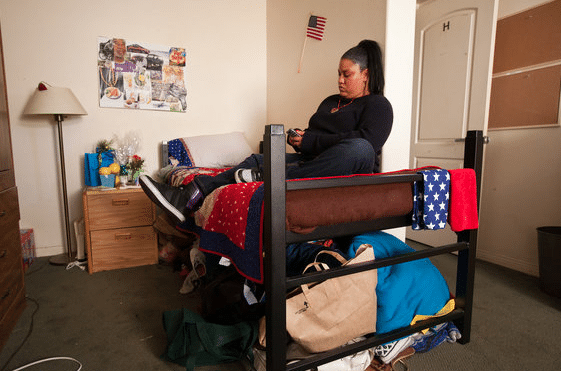Female Veterans With Lives in Limbo
February 28, 2013
Collectively, female veterans are the fastest growing segment of the homeless population
By PATRICIA LEIGH BROWN, New York Times –
LOS ANGELES — In the caverns of her memory, Tiffany Jackson recalls the job she held, fleetingly, after leaving the military, when she still wore stylish flats and blouses with butterfly collars and worked in a high-rise with a million-dollar view.
Two years later, she had descended into anger and alcohol and left her job. She started hanging out with people who were using cocaine and became an addict herself, huddling against the wind on Skid Row here.
“You feel helpless to stop it,” she said of the cascade of events in which she went from having her own apartment to sleeping in seedy hotels and then, for a year, in the streets, where she joined the growing ranks of homeless female veterans.
Even as the Pentagon lifts the ban on women in combat roles, returning servicewomen are facing a battlefield of a different kind: they are now the fastest growing segment of the homeless population, an often-invisible group bouncing between sofa and air mattress, overnighting in public storage lockers, living in cars and learning to park inconspicuously on the outskirts of shopping centers to avoid the violence of the streets.
While male returnees become homeless largely because of substance abuse and mental illness, experts say that female veterans face those problems and more, including the search for family housing and an even harder time finding well-paying jobs. But a common pathway to homelessness for women, researchers and psychologists said, is military sexual trauma, or M.S.T., from assaults or harassment during their service, which can lead to post-traumatic stress disorder.
Sexual trauma set Ms. Jackson on her path. At first she thought she could put “the incident” behind her: that cool August evening outside Suwon Air Base in South Korea when, she said, a serviceman grabbed her by the throat in the ladies’ room of a bar and savagely raped her on the urine-soaked floor. But during the seven years she drifted in and out of homelessness, she found she could not forget.
 Of 141,000 veterans nationwide who spent at least one night in a shelter in 2011, nearly 10 percent were women, according to the latest figures available from theDepartment of Housing and Urban Development, up from 7.5 percent in 2009. In part it is a reflection of the changing nature of the American military, where women now constitute 14 percent of active-duty forces and 18 percent of the Army National Guard and the Reserves.
Of 141,000 veterans nationwide who spent at least one night in a shelter in 2011, nearly 10 percent were women, according to the latest figures available from theDepartment of Housing and Urban Development, up from 7.5 percent in 2009. In part it is a reflection of the changing nature of the American military, where women now constitute 14 percent of active-duty forces and 18 percent of the Army National Guard and the Reserves.
But female veterans also face a complex “web of vulnerability,” said Dr. Donna L. Washington, a professor of medicine at U.C.L.A. and a physician at the West Los Angeles Veterans Affairs medical center, who has studied the ways the women become homeless, including poverty and military sexual trauma.
Female veterans are far more likely to be single parents than men. Yet more than 60 percent of transitional housing programs receiving grants from the Department of Veterans Affairs did not accept children, or restricted their age and number, according to a 2011 report by the Government Accountability Office.
The lack of jobs for female veterans also contributes to homelessness. Jennifer Cortez, 26, who excelled as an Army sergeant, training and mentoring other soldiers, has had difficulty finding work since leaving active duty in 2011. She wakes up on an air mattress on her mother’s living room floor, beneath the 12 medals she garnered in eight years, including two tours in Iraq. Job listings at minimum wage leave her feeling bewildered. “You think, wow, really?” she said. “I served my country. So sweeping the floor is kind of hard.”
Not wanting to burden her family, she has lived briefly in her car, the only personal space she has.
Some homeless veterans marshal boot-camp survival skills, like Nancy Mitchell, of Missouri, 53, an Army veteran who spent years, off and on, living in a tent.
“That’s how we done it in basic,” she said.
Double Betrayal of Assault
Of more than two dozen female veterans interviewed by The New York Times, 16 said that they had been sexually assaulted in the service, and another said that she had been stalked. A study by Dr. Washington and colleagues found that 53 percent of homeless female veterans had experienced military sexual trauma, and that many women entered the military to escape family conflict and abuse.
For those hoping to better their lives, being sexually assaulted while serving their country is “a double betrayal of trust,” said Lori S. Katz, director of the Women’s Health Clinic at theV.A. Long Beach Healthcare System and co-founder of Renew, an innovative treatment program for female veterans with M.S.T. Reverberations from such experiences often set off a downward spiral for women into alcohol and substance abuse, depression and domestic violence, she added.
“It just pulls the skin off you,” said Patricia Goodman-Allen, a therapist in North Carolina and former Army Reserve officer who said she once retreated to a mobile home deep in the woods after such an assault.

